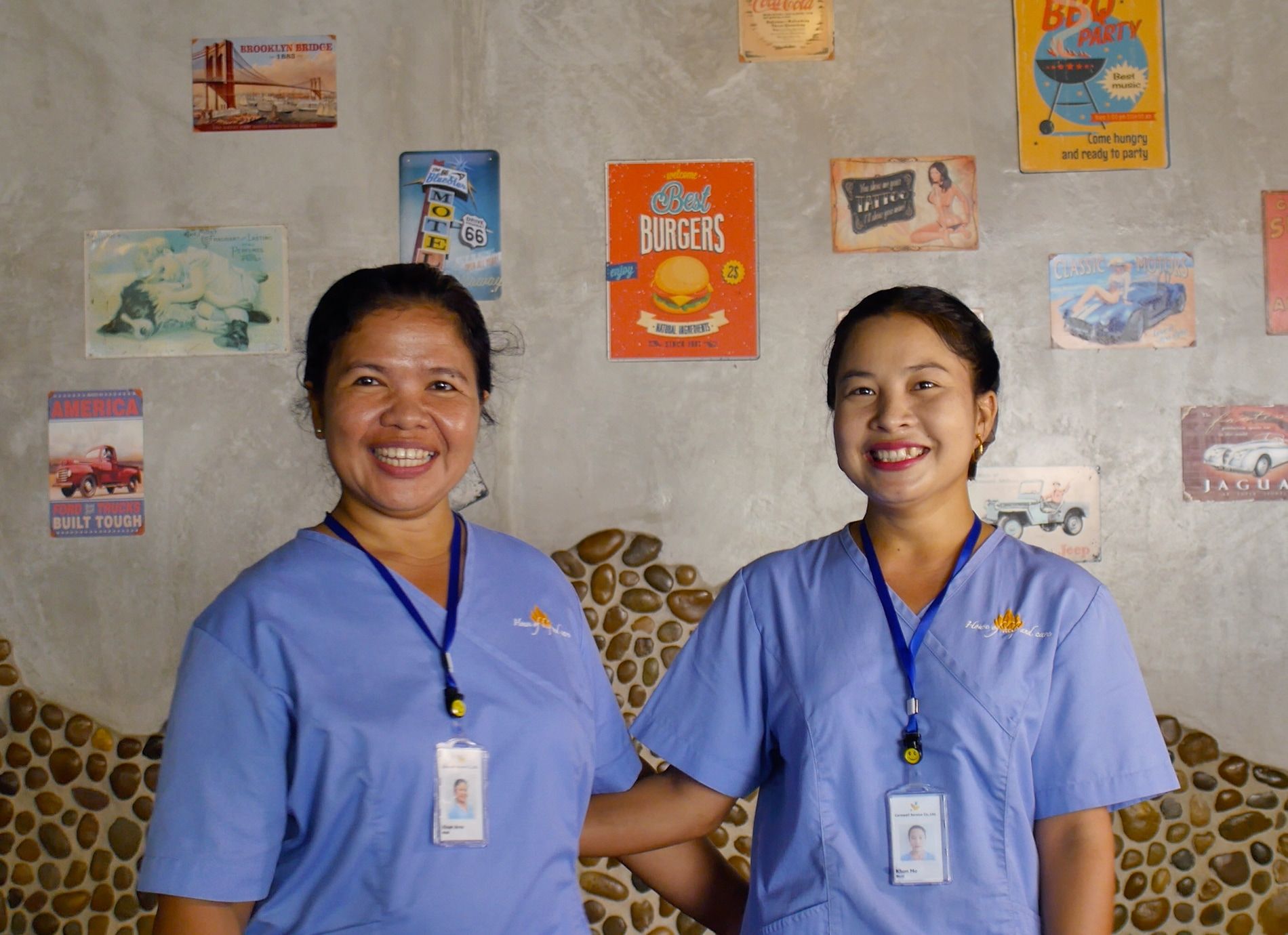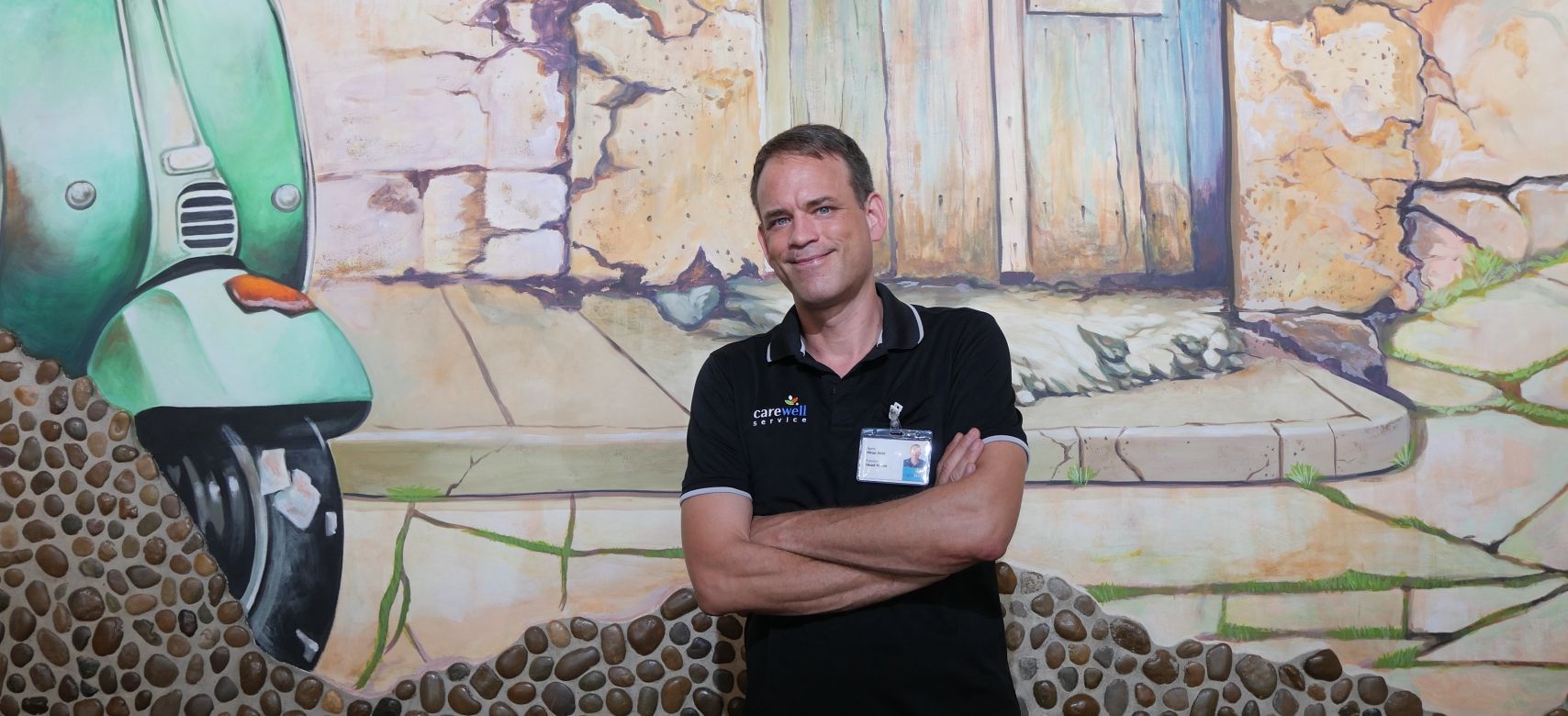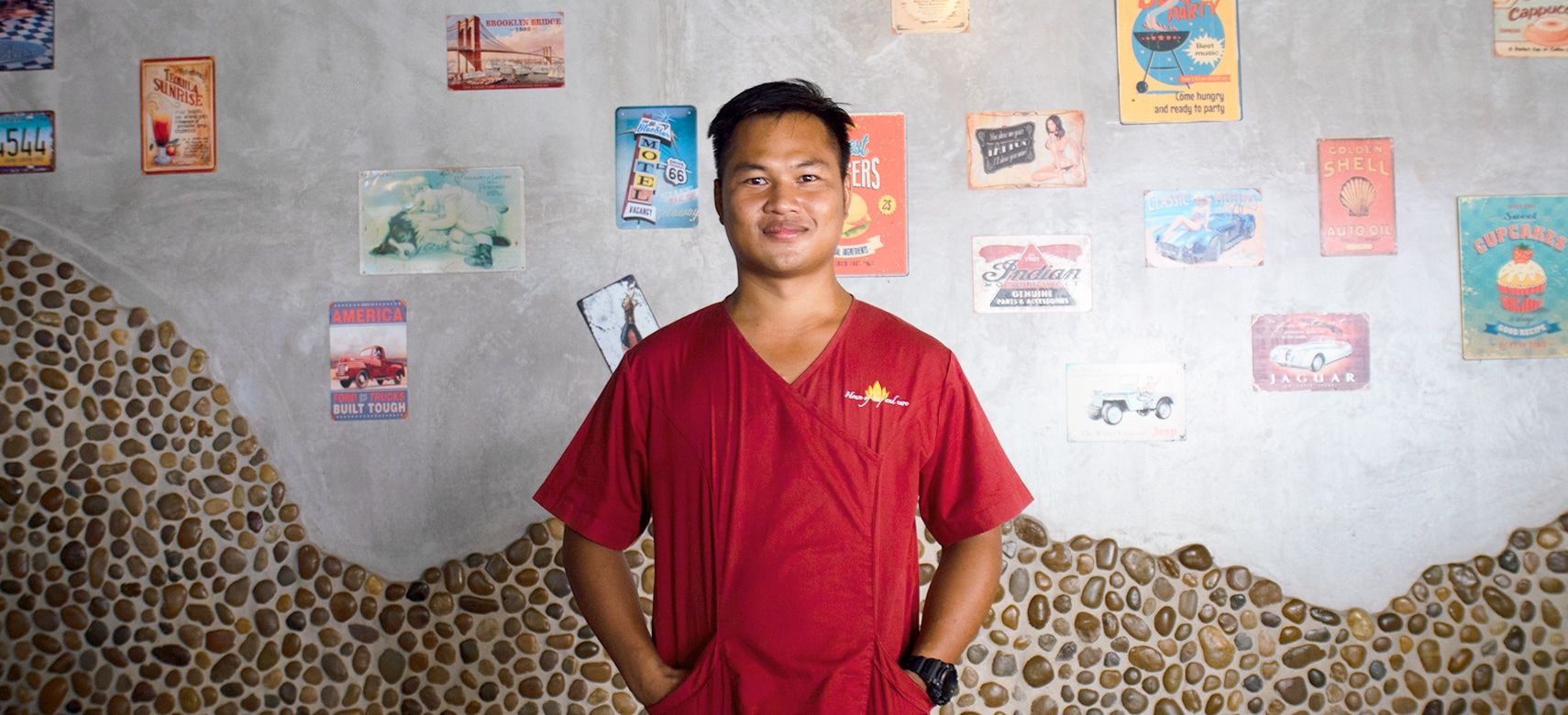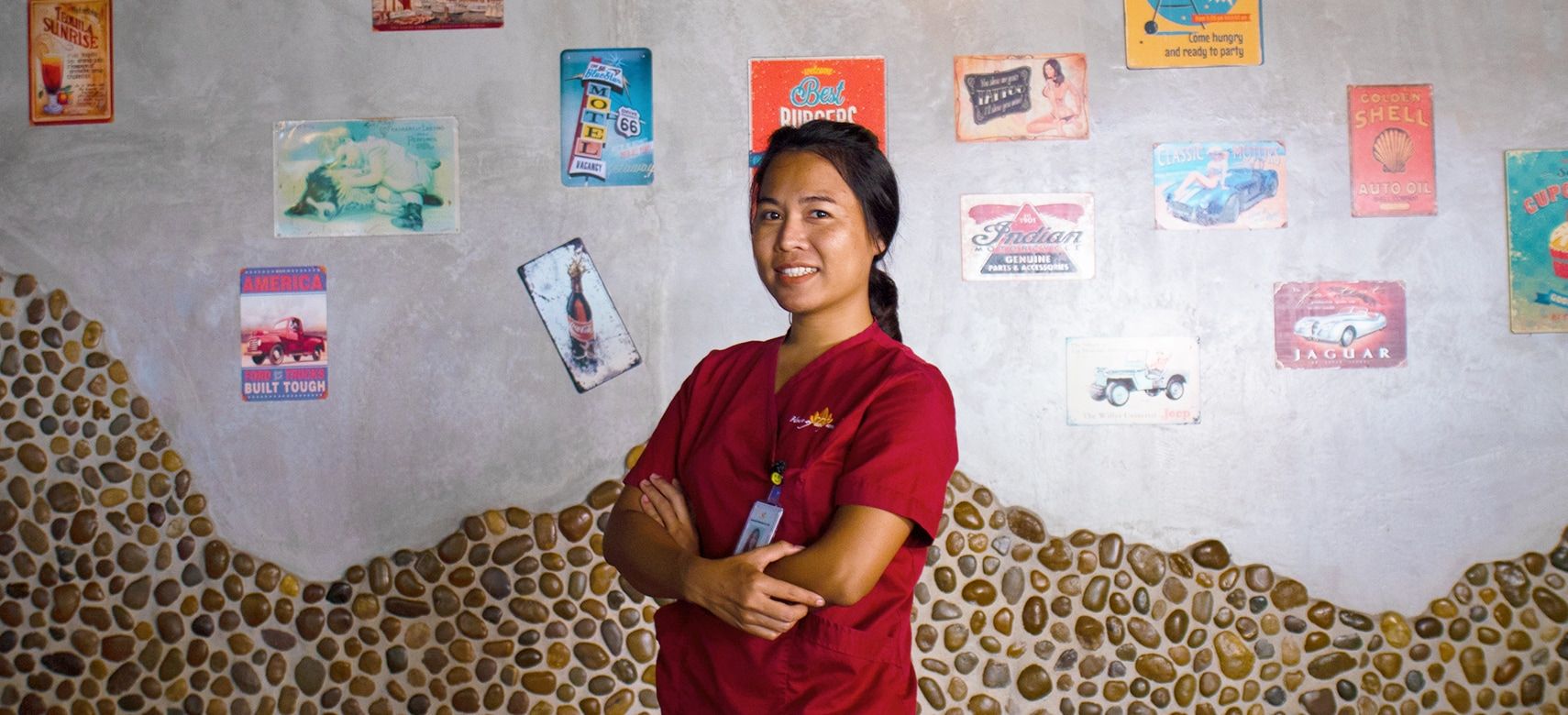Carewell Staff

Story of our Staff

My responsibility as the Head Nurse is to take care of staff and residents.
Imagine being able to provide care in a country where time pressure and staff shortages don't determine your everyday life - but rather a sunny climate, warm colleagues and happy guests. This is exactly what I experienced a few years ago when I decided to give up my life in Germany and start again in Thailand with Carewell Service.
It all started with a spontaneous vacation that sparked a fascination for the country and its people. A vague idea turned into a concrete opportunity: a job advertisement was urgently looking for German-speaking care workers. With the thought “If I don't try it now, I'll regret it later”, I took the plunge and a few months later found myself in a facility where care looks completely different:
- More staff, more time for people: instead of assembly line work and a hectic pace, we at Carewell Service focus on a high level of care. With around 28 guests, there are up to 18 care staff per shift. This means: more attention, more conversations and more human closeness.
- Vacation feeling instead of everyday home life: trips to the beach, joint restaurant visits or small barbecue evenings take place here - almost as if you were on vacation all year round. This not only improves the quality of life for our residents but also enhances the working atmosphere enormously.
- Less bureaucracy, lower cost of living: Although the salary is slightly lower than in Germany, significantly reduced taxes and lower local costs mean that more income is ultimately left over.
- Warm hospitality: Thai colleagues are known for their friendly and respectful manner. Even without a common language, there is a deep bond with the guests.
- International standards: Modern hospitals, general practitioners and specialists are easily accessible. Physiotherapy, occupational therapy and speech therapy are available as required - often much more intensive than in many European facilities.
I have been living in Thailand for over six years now and still rave about my decision. I can only encourage anyone who is interested in this path to do the same if they feel like making a fresh start. Whether for one, two years or longer - every step and the experience gained is an enrichment.
How does one manage a staff of 60+? Best Processes and Practices.
“We have a set of good guidelines and rules. And I have 3 Deputy Nurses who help me or manage when I am not here.”
While CAREWELL offers a lot of fringe benefits, the company is also very strict about adhering to policies and procedures. This, in turn, ensures the CAREWELL-level of quality care.

What does your job responsibilities entail?
Chinnawat Seekhamma, who goes by “Bom,” is a physical therapist with Carewell’s Baan Tschuai Duu Lää (House of Help and Care). “Primarily, I help guests who are physically injured and afflicted by Alzheimer’s, dementia and Parkinson’s diseases. I work with our guests using individual rehabilitation and strengthening exercise plans.”
Depending upon their needs and capabilities, Bom will work with guests in the privacy of their room or in the pool; or in the own therapy room. “Our Physiotherapy room has a various training- or special therapy devices as well, as equipment for electrotherapy and ultrasound. Our well-equipped therapy room offers the most diverse possibilities to improve the balance, strength and mobility, we set on a range of light weights, multiple balls, a core balance ball, steps, functionality games, flotation devices for aquatic therapy, and other equipment such as the small cones we use for walking coordination.”
Bom has also been trained to provide the much appreciated massage therapy, of which many guests feel is a treat, rather than therapy.
One of the other activities Bom enjoys, when working with the guests, is the frequent group trips to the beach. Many of the guests like to walk the short distance with their daily nurse. Bom will also walk with the guests on the beach—individually, to provide support as needed. This helps build endurance and balance…and it is also a way to enjoy the beautiful scenery of Rawai Beach or some other beaches around Phuket.
Education and Training
Bom attended a 1-year nurses’ aide training program at the Siam Boi Bahd Saahd School in Chiang Mai. After completing the certificate program, Bom headed to Bangkok. Like many of his colleagues, he worked at the Senior Nurses Home Hospital. There he worked for 2 years.
One day, a friend of CAREWELL’S now-Deputy Nurse Nan, called up Bom to tell him that a new nursing and rehabilitation home in Phuket would be opening soon and is looking for staff. Wanting to see what it was about, Bom travelled to Phuket and stayed with Nan while he interviewed with Anita—who ultimately hired him.
“I had been a nurse at CAREWELL for 2 years, when Anita decided to include physical therapy as part of our guest services.” CAREWELL soon brought on a physical therapist (PT) who quickly recognized Bom’s interest in physical therapy. She took him under her wing and trained him extensively. Bom has now been enjoying working with guests in a rehabilitative capacity for more than 6 years.
Physical Therapy
“I became a nurse because I wanted to help people. I liked to help people who cannot help themselves. As a physical therapist, I can now help them to help themselves. I like that,” he grins widely, “…a lot.”
“At CAREWELL, I learned about many rehabilitative exercises and how they help. I learned to work with the guests so that they have proper positioning and are exercising correctly. Also, not every guest is the same. Each guest is evaluated for their individual needs and level of capability. A plan is then created exclusively for them…it is tailored to their needs and goals. It is adjusted as their needs and abilities change.
Ultrasound, electric stimulus and heat packs are also used for treatment should their plan include it. And yes, we always check the guest’s blood pressure before we begin any therapy session.”
Bom says he really enjoys knowing that he has helped guests to get stronger and loves when he sees their mobile functionalities improve. “Sometimes,” he says speaking of working with guests affected by dementia, “I just use things within the familiar surroundings, such as the small stones by their villa pool. The stones are small and are in various sizes, shapes and textures. I will place them on the table in front of the guest and have them move each stone to another part of the table or put them in a cup which I will move around during the exercise. This improves their coordination and grasping ability. It strengthens hands and fingers by the flexing and grasping movements for small objects; sends stimuli to the brain; and stretches the arm, shoulder and back when they must stretch to move the stones to further-away points on the table. The stones are also something they see every day, so it is cognizant.”
Depending upon each patient’s capabilities, Bom will use passive movement therapy while other guests might work with light weights, walk on the treadmill or use the stationery bike.
Each villa has its own pool. Oftentimes, the PTs will team up with the daily nurse to work with the guests in their own pool. But many tend to enjoy aquatic therapy as a group activity. So, a couple of times a week, there is group aquatics. Not only do the PTs get into the pool with the guests, but the nurses of each of the guests participating that day, will also join in for safety measures and to maintain the homey-community feel.
As it turns out, group aquatics, often feels more like a pool social. “Making each guest feel included is a core concern for CAREWELL, especially for the Alzheimer’s, dementia and Parkinson’s guests. The social interaction and connection is beneficial…” he pauses thoughtfully, then adds, “to everyone and is very therapeutic for all of us.”
What I like about working at CAREWELL
“Before I came to CAREWELL, I couldn’t speak any English. Here, I’ve learned a lot—and not just English. I’ve also learned some German. I’ve learned about the various medicines our guests are administered; about various medical procedures, such as how to insert NG tubes, about IV lines; and how better to work with our guests. When I became interested in Physical Therapy, I was given the OK to train with the PT when I explained to Anita how much I would like to work with our guests in this way.”
After reflecting for a moment, he said with a huge grin, “I have a very good boss—a very good boss that helps. I like working with Anita. And we have a very good team that works together. I think…yes, family. We are like a family. I like my job here. I like working here. I even learn from the guests.”
One of Bom many talents is that he is often easily able to relate to the guests and calm them should they become anxious as a result of the progressing of early stage Alzheimer’s and dementia. He also likes being helpful to staff members from each of the departments. “I can help CAREWELL with everything CAREWELL needs.” And he does, from cooking to gardening to minor maintenance to nursing and of course, physical therapy.
At the close of our interview, Bom started to walk away. He stopped, turned slowly around with his index finger extended in front of him. He said thoughtfully, “CAREWELL is number 1 in Phuket may in Thailand. All of our team works together to help and THAT makes CAREWELL better and better.”
I thought about what he said, “I became a nurse because I wanted to help people. As a physical therapist, I can help them to help themselves.” And came to the conclusion: Together with Carewell, helping people, is indeed, what they do.

is affectionately called 'Umli' by the owner, Anita, because of her petite size and that she is much smaller than a former colleague who was also named Um. She is in charge for all Guest activities by CAREWELL.
Not Just a Nurse But a Creative Activities Proponent
As an experienced nurse, Um provides practical and eldercare nursing services to the guests. “I still perform nursing duties such as giving medication to guests, changing diapers, cleaning and bandaging wounds. I also train the new nurses.”
Um is certified in Deep Tissue Thai Massage Therapy and manages the CAREWELL Massage Team. She also runs the Guest Activities program, for which she creates monthly plans of daily activities and “off campus” excursions. Because Um, has such a creative streak and the gift of being able to watch and do, she’s taken on projects like decorating the Massage Sala and Activities Tent; creates flower bouquet offerings and kratongs; as well as organizes the annual holiday party and choreographs dances for it. She learned to cut hair by watching and shares this skill with the guests and even staff members.
Um tries to keep the guests involved and active. “Some are mobile and can get around. Others cannot. I...well, we care for them in their rooms and help move them around to different places at CAREWELL. This way, they remain integrated and involved in the community. We wheel them to the common areas or outside by the beaches around. We also have a own Restaurant- cafe and a massage room. Recently, we created an activities tent where we show movies, play music, games and some guests prefer to have their meals out there. Some come to talk and some come to just relax. It’s a nice area for everyone to gather when they feel up to it...or if they want some company.”
Some of the activities Um puts together consists of cooking simple dishes such as Thai desserts; painting and coloring; salon activities such as haircuts, manicures and pedicures; board games and group games where staff and guests play together with large light balls; pétanque; badminton; ping pong; swimming; aerobics/dancing, “I show them steps they can do standing or sitting, whatever their abilities. We can do these for an hour or two, depending upon the activity.”
“We watch current movies and movies from their time. We project them onto a big screen. We plan for 4 to 5 movies per week. The guests really enjoy them...especially the old movies because they take them back to their ‘good ol’ days.’ The old movies have many benefits. It triggers the memory; brings up feelings of nostalgia; gives them a sense of belonging, because they feel a part of it...a part of ‘home,’ if you will. We do this in the evenings in the Activities Tent, which is open and airy, so it’s like watching movies out-of-doors which complements that sense of freedom, independence, they knew back then.”
"I try to make this a communal operation. If the staff have ideas for activities they believe the guests will enjoy, we will get the necessary supplies."
Um’s Educational Journey
Before becoming a nurse, Um was a telephone operator. It was Um’s parents who suggested a nursing career path. She did not think she would like it but agreed to go through the program to understand what it was like to work with patients; and would make her decision before testing began.
At the end of the program, Um had made her decision to leave. Then the 2013 floods of Bangkok happened. “I had nothing, but I knew I could take care of myself. My body worked. I could get around. But others could not. Big vehicles would bring food for me and the other students. Others, who could not get around, could not take care of themselves. I saw this. So I called the school and talked to my Doctor-teacher. He was not very happy with me, ‘You go? You fly away? Why? People stay and take care of patients in the hospital. The patients cannot walk. They cannot eat. But you go. You go out. You fly away! Why? How can you? How can you leave?’”
Um reflected, “There were patients in a room not far from me. They could not eat. They could not shower...I could not just leave them.”
Returning back to school for testing, Um found it difficult to deal with dementia patients. She would get as angry as the patients. With the mentoring of her doctor-teacher, Um began to understand she had internal issues of her own that she must confront. He told her, “The patients have dementia. Mental disabilities that do not allow them to control their anger. You do not have that. And you do not have patience...but you can. You cannot fight with the patients, but you can control your anger. You can control yourself. Why do you have anger? You must understand your anger. You can.”
Thus began Um’s own journey, with the help of her mentor. Once Um came to understand her own internal struggles, she came out from under that dark shadow and her outlook changed. Now, learning and understanding more and more about the progression of Alzheimer’s created more and more sympathy within her. “Nurses understand pain. They understand headache. But dementia and Alzheimer’s needs an additional nursing skill-set. When I came to understand this, I didn’t even mind changing diapers anymore. I just wanted to help them because they could not help themselves. I want to make things better for them.”
"Even now, I go home and I find myself problem-solving for our guests, 'How can we make 'this' easier for them? How can we do 'this' better? How can I get '[this guest]' to become more responsive to 'this'? Sometimes, I find I have been sitting at home running solutions through my head, trying to solve this issue or that and then realize hours have passed. Sometimes I even have dreams about how I can help or about different activities I can do with them.”
Um ended up completed 3 separate study programs to 1) work with the hospital patients; 2) care for the elderly; and 3) work with small children and infants. This included the 1-year study program in Bangkok with 6 months of intense practical training and testing over constant 12- hour shifts at the hospital. “Being on my feet for so long, my legs were often so tired.” She also went to Chiang Rai to study at the Military Academy Nursery for a course to learn about working babies and small children. It is a nursery for children of military parents. It was a very strict program.”
"When studying to care for babies and small children, I found there are similar techniques for care and training when working with Alzheimer's and dementia patients. As the dementia moves from the back of the head to the front, there is more and more loss of cognizance and reasoning. And like babies, progressed dementia results in a loss of reasoning. Babies do not have the experience for reasoning, yet. So we must be patient with both. But we can train both, babies...small children and adults with early stage dementia, using repetitious behavior. We must comfort them so they feel safe. We cannot become frustrated and angry also, this will only increase their own frustration and anger. I explain and try to be the example of this to our new and younger nurses."
“While at University, learning to read body language was an important part of my studies. Not everyone speaks the same language so I must observe to determine where they have pain. Sometimes it's external, like a wound or bruising to the arm, side, foot. Or it might be internal...head, stomach or nerves, muscular, fractured bone...This is some of what I train and review with the new nurses."
The Road to CAREWELL
Just before coming to CAREWELL, one of Um’s patients was an elderly grandfather in Chiang Rai, who had suffered a stroke. He was bedridden with paralysis in his legs and arms. The doctor said he would not walk again. But Um believed he would. She sought out a doctor of Traditional Chinese Medicine. His test results indicated her patient could indeed be helped. Um continued caring for the grandfather during the Chinese medicine, acupuncture and Thai massage treatments. After 5 months of treatments, her grandfather-patient recovered 80% of his functionalities. He was able to walk and care for himself, again. While Um was now in need of a new job, she was thoroughly happy and proud to have been a part of her patient’s recovery. She then set off for Phuket. Not long after, her mentor would tell her about Carewell.
CAREWELL was still in need of another good nurse. Khun Nan had called Um’s university and spoke to Um’s mentor. Nan asked him if he would recommend a good and reliable nurse.
Um met and liked her new boss, Anita, very much. She also loved the beautiful and tranquil setting of CAREWELL and still feeling ‘on top of the world’ about her former grandfather-patient’s recovery, Um felt very fortunate and positive about her career as a nurse. She held great gratitude toward her mentor.
Um has now been at CAREWELL for 6 ½ years. When she first began at CAREWELL, there were only 5 guests. Now it has blossomed into a wonderfully large communal family of 24 guests and a staff of more than 60 made up of nurses, physical therapists, a chef, administration, housekeepers and gardeners to care for the guests and their environment.
‘We’re a happy family because it’s a good family. I have learned much at CAREWELL and Anita has been good to me...to all of us. I am proud I am a nurse. I help people. That is good'



